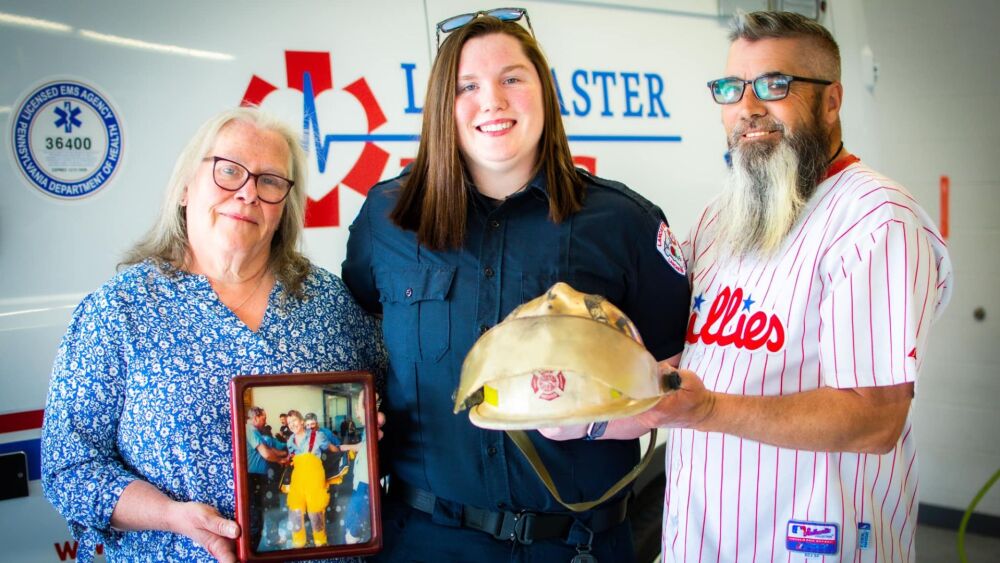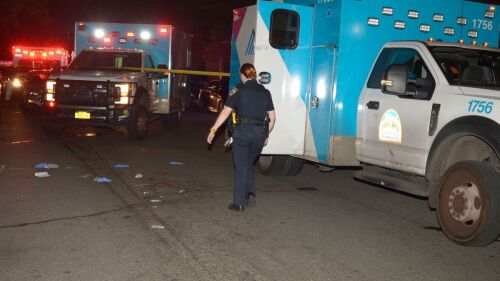By Nathan Willison
LNP
LANCASTER, Pa. — Lancaster EMS first responders understand that stress is an inevitable part of the job.
With shifts that can last up to 16 hours, and include 17 emergency calls in a day, knowing how to manage the inevitable mental and emotional pressure is critical to success in the field.
Melanie Kempf, a paramedic who has been with Lancaster EMS for five years, knows the mental toll the job can take better than most.
Three years ago, she was stabbed by a patient in an ambulance, an incident that not only changed her life, but also led to changes in the way first responders here receive support after difficult experiences.
In February 2022, when Kempf was an EMT, she and a coworker were on duty in Lancaster city when they responded to a routine report of a person down in the 200 block of North Arch Street.
Once there, they found 27-year-old Jeremic Medina-Dorta, a Columbia man who claimed he was under the influence of acid and had glass stuck in his foot.
From the beginning, Kempf said Medina-Dorta seemed paranoid and skittish. Lancaster city police officers arrived and helped Kempf and her coworker persuade Medina-Dorta to get onto a stretcher and into the ambulance. A city police officer followed them into the ambulance to assist.
As they entered the ambulance Medina-Dorta became increasingly agitated, and Kempf and her coworker made the decision to sedate him. As they attempted to hold Medina-Dorta’s arms down to sedate him, he kicked the police officer into the back corner of the ambulance.
Kempf tried to reassure Medina-Dorta that they didn’t mean any harm, but he began to kick and punch at both paramedics. That was when Kempf felt a burning sensation in her abdomen.
“We were still trying to hold him. I looked down and noticed a knife on him. At that point I realized I was stabbed by the patient,” Kempf said. “And he just kept stabbing.”
As the police officer attempted to wrestle the knife away from Medina-Dorta, Kempf’s boots became lodged between the stretcher and the side of the ambulance.
Just as her coworker pulled her away, Medina-Dorta grabbed at the police officer’s holstered gun, firing a bullet into the spot where Kempf had just been.LNP — LancasterOnline reported at the time that the officer didn’t immediately realize his gun had gone off as he wrestled the knife away from Medina-Dorta.
What followed was two years of investigations and court dates before Medina-Dorta pleaded guilty to four counts of aggravated assault and other charges in February 2024. He was sentenced to four to 14 years in prison.
Recovery
On April 28, Kempf was on a routine morning shift. Her first call of the day came within minutes of her signing on, a sick person needing transportation to Lancaster General Hospital.
A little more than a year ago, she earned her paramedic certification and can now perform more advanced medical procedures on her calls.
Kempf said she wanted to earn her certification to provide more intricate care for her patients — “her people.”
However, recovery from the stabbing took time for Kempf, even after the physical wounds healed.
“It was two years of not really sleeping well,” Kempf said. She said until Medina-Dorta was sentenced, she never felt fully safe on the job.
At the time of the incident, she was working her way through paramedic school, but felt like she had to take a break. She said she experienced bursts of anger during her work day, and nightmares at night. Kempft was continually frustrated by delays in the court process for Medina-Dorta’s charges.
Kempf credits her supervisor, Cpt. Dawn Ray, with helping her through the recovery process.
“I went to therapy and Capt. Ray was taking me to my appointments just to have someone there for me,” Kempf said.
Ray, who has been with Lancaster EMS for 32 years, is a member of Lancaster County’s Critical Incident Stress Management team, a group of mental health providers and first responders who provide support to their fellow emergency responders following difficult experiences.
Immediately after a particularly stressful incident, the team gathers the first responders and emergency dispatchers involved to debrief together.
Just by sharing their experience with one another Ray said participants get a better understanding of what happened, allowing them to process the incident.
“Through these debriefings they learn they aren’t the only ones going through these experiences and having these thoughts,” said Dr. Ken Ralph, the clinical director of the Critical Incident Stress Management. “They’re hearing that they’re having normal reactions to unusual experiences.”
During a debriefing, Ralph said first responders take the lead in discussing what happened while mental health professionals are there to provide input and make referrals when more help is needed.
Through the mental health professionals on the team, Kempf was connected with a therapist that specializes in treating first responders and introduced to Eye Movement Desensitization and Reprocessing therapy, a technique that involves moving your eyes in a specific way while you process traumatic memories. According to the Cleveland Clinic, the therapy focuses on changing the emotions, thoughts or behaviors that result from a distressing experience.
“It helped tremendously to the point where I can talk about this call,” Kempf said. “I can educate our new EMT students on it.”
Education
Since the fall of 2021, Lancaster EMS has operated its EMT Academy to train the next generation of EMTs in the county.
Kempf’s experience has become a part of the academy’s education. For each class, Kempf retells her story as a way to educate future medical providers.
“We take what happened to me and say, ‘what can we do to make sure it never happens again,’” Kempf said.
Kempf shares her experiences using footage of the incident as a way to discuss both safety measures for medical providers and the effects of post-traumatic stress.
“We break it down slide by slide and talk about what happened on the call.” Kempf said. “You hope it never happens again but the chances of it happening have increased.”
While the experience has emphasized the danger inherent to her work, it hasn’t caused her to stray from the ultimate purpose of being an emergency medical provider — caring for others at the most difficult points in their lives.
“We are here for your worst days, to be compassionate and empathetic,” Kempf said. “We’re there to be a helping hand.”
© 2025 LNP (Lancaster, Pa.).
Visit lancasteronline.com.
Distributed by Tribune Content Agency, LLC.








